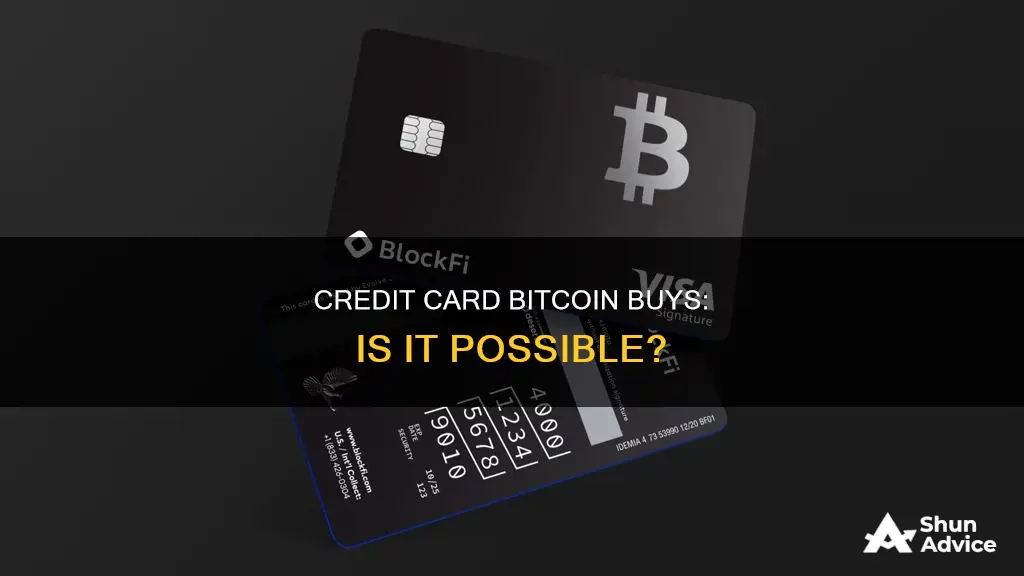
Bitcoin is a cryptocurrency with a finite supply, and its value comes from its payment system and store of value. It can be purchased through a cryptocurrency exchange, and there are several ways to pay for it, including via credit card. However, it is important to note that not all exchanges allow credit card purchases, and there are risks and additional fees associated with this payment method.
| Characteristics | Values |
|---|---|
| Can you invest in Bitcoin with credit? | Yes |
| Risks | High-interest rates, high-fee cash advance loan, fraud, cyber-attacks, financial crime, firm failure, etc. |
| Recommended? | No |
| Steps to buy Bitcoin with credit | 1. Research the credit card and payment company. 2. Research the exchange. 3. Link the credit card. |
| Credit card providers that allow crypto purchases | American Express, Visa, Mastercard |
| Credit card providers that block crypto purchases | TSB, Virgin Money, Tesco Bank |
| Crypto exchanges that allow credit card purchases | Binance, Kucoin, Crypto.com, Gemini |
| Crypto exchanges that don't allow credit card purchases | Coinbase |
What You'll Learn

Research the credit card
If you are considering investing in Bitcoin with a credit card, it is important to first research the card and the payment company. Not all credit cards support the purchase of Bitcoin, so it is crucial to verify this information before proceeding.
Different credit cards come with varying fees, so it is essential to understand the fees charged by the payment company. For instance, credit card companies often treat cryptocurrency purchases as cash advances, resulting in higher fees and interest rates.
When selecting a credit card to buy Bitcoin, consider the following:
- Higher interest rates: Cash advances, including cryptocurrency purchases, typically incur higher annual percentage rates compared to regular purchases.
- Foreign exchange fees: If you use an exchange outside of your home country, your credit card company may charge a foreign exchange fee, typically around 3%.
- Cash advance fees: These are one-time fees, usually ranging from 3% to 5% of the withdrawn amount, charged when you take out a cash advance.
- No grace period: Unlike regular purchases, cash advances start accruing interest immediately, and credit card companies do not offer a grace period for these transactions.
- Lower credit limit: Some credit cards have a separate, lower cash advance credit limit, which is important to keep in mind when planning your purchase.
- Credit utilization: Large crypto purchases can significantly impact your credit score by utilising a substantial portion of your available credit.
- No credit card rewards: Cryptocurrency purchases may not qualify for credit card rewards such as cashback, travel points, or miles.
Before using a credit card to invest in Bitcoin, be sure to research the card and the payment company to understand their policies and any associated fees. Additionally, consider the potential risks and impacts on your credit score.
Unlocking Bitcoin Loophole Investment Strategies
You may want to see also

Research the exchange
Before buying Bitcoin, it is important to research the exchange you will be using. Some exchanges support the purchase of Bitcoin using credit cards, but others may not. Even when you go through an exchange that allows credit card purchases, it may take time to process and validate the transaction. Exchanges that don't accept credit card purchases simply use peer-to-peer (P2P) means for the transfer of Bitcoin.
Some popular exchanges that use credit cards for the purchase of Bitcoin include Binance, Kucoin, and Coinbase.
When choosing an exchange, it is important to consider the following:
- Fees: Every exchange charges different fees for buying Bitcoin with a credit card. For example, Coinmama charges an additional fee of 3.24% to 3.34% for purchases made with a credit card.
- Security: Choosing an exchange with a good security reputation is important to protect your personal information.
- Verification Requirements: Some exchanges may require you to verify your account by providing personal information such as a copy of your identification, proof of address, and your Social Security number.
- Minimum Deposit: Different exchanges have different minimum deposit requirements. For example, Binance requires a minimum deposit of $10, while Coinbase requires $50.
- Withdrawal Options: If you plan on withdrawing your Bitcoin, make sure to check if the exchange allows withdrawals and if there are any associated fees.
- Wallet Options: Some exchanges offer integrated Bitcoin wallets, while others allow you to use a third-party wallet.
Federal Employees: Bitcoin Investment Options
You may want to see also

Link the credit card
Once you've found an exchange that meets your requirements, verify your account by providing your personal information to meet Know Your Customer (KYC) requirements. The next step is to link your credit card to the exchange. To do this, enter your full name, card details, and billing address.
When you select Bitcoin, enter the amount you desire and choose the option of paying with a credit card. You will then be redirected to your bank's one-time password transaction page. Follow the instructions and get your Bitcoin deposited into your wallet, provided the transaction is successful.
Cryptocurrency investors can now buy and sell Bitcoin exchange-traded funds (ETFs). The Securities and Exchange Commission (SEC) approved 11 ETFs in January 2024 for trading on several exchanges, including the NYSE Arca and the Nasdaq. Among the funds are the Grayscale Bitcoin Trust (GBTC), the Bitwise Bitcoin ETF (BITB), and the Hashdex Bitcoin ETF (DEFI).
Factors to consider when linking your credit card
When linking your credit card to buy Bitcoin, there are several factors you must consider.
Research the credit card
Not every credit card supports the purchase of Bitcoin. Credit cards that support Bitcoin purchases include:
- American Express
- Visa
- Mastercard
Each of these cards demands unique fees. Researching these cards gives insight into the fees each payment company charges.
Research the exchange
Some exchanges support the purchase of Bitcoin using credit cards, but others may not allow this type of purchase. Even when you go through an exchange that allows credit card purchases, it may take time to process and validate the transaction. Exchanges that don't accept credit card purchases simply use peer-to-peer (P2P) means for the transfer of Bitcoin.
Some popular exchanges that use credit cards in the purchase of Bitcoin include Binance and Kucoin.
Be aware of transaction fees and other considerations
When swapping dollars for Bitcoin or any other cryptocurrency, it's important to understand that an exchange may charge a fraction of the transaction cost. In most cases, an additional fee is charged when investors decide to fund their accounts using credit cards. The exchange may also charge extra fees for its services.
For example, Coinmama charges an additional fee of 3.24% to 3.34% for purchases made with a credit card. This means purchasing $1,000 worth of Bitcoin using a credit card will attract an extra fee of $33.40, excluding platform fees.
Additionally, your credit card issuer is likely to view the crypto purchase as a cash advance, which can result in higher interest rates, foreign exchange fees, cash advance fees, and a lower credit limit.
Other options for buying Bitcoin
If you don't want to link your credit card to an exchange, there are other ways to buy Bitcoin:
- Bitcoin ATMs: These act like in-person bitcoin exchanges, allowing individuals to insert cash into a machine to purchase Bitcoin, which gets transferred to online wallets.
- P2P exchanges: These provide a more direct connection between users, allowing them to buy or sell Bitcoin directly with each other.
- Payment processors: You can use a payment processor like PayPal to buy Bitcoin, either by connecting your account to a debit card or bank account or by using the balance of your PayPal account to purchase cryptocurrencies from a third-party provider.
Coinbase Crypto: Best Bets for Your Digital Wallet
You may want to see also

Understand the risks
Before investing in Bitcoin with a credit card, it is important to understand the associated risks. Here are some key points to consider:
Market Volatility
Bitcoin is a highly volatile investment, meaning its price can fluctuate drastically in a short period. While this volatility creates opportunities for profits, it also increases the risk of losses. Investors must be prepared for the possibility of significant price swings and be comfortable with the potential for substantial gains or losses.
Fees and Interest Charges
Using a credit card to buy Bitcoin can incur various fees and charges. Credit card processing fees, transaction fees charged by the exchange, and potential interest charges on unpaid credit card debt can quickly add up, increasing the overall cost of the investment. It is crucial to understand the fee structure of both the credit card and the exchange before proceeding.
Security and Fraud
The world of cryptocurrency is prone to scams and fraudulent activities. It is essential to use reputable exchanges and follow security best practices to protect personal information and funds. Additionally, choosing an exchange with a strong security reputation can reduce the risk of personal and financial information being stolen.
Cash Advance Penalties
Credit card issuers often treat cryptocurrency purchases as cash advances, which can result in higher interest rates, foreign exchange fees, cash advance fees, and a lower credit limit. These additional fees and charges can significantly impact the overall cost of the investment.
Credit Utilization
Making large crypto purchases with a credit card can use up a significant portion of the available credit limit, which can negatively affect credit scores. It is important to consider the impact on credit utilization and ensure that crypto purchases do not exceed a manageable level.
Tax Implications
In many jurisdictions, cryptocurrencies like Bitcoin are subject to tax regulations. Any gains from the appreciation of Bitcoin's value may be taxable, and transactions may come with reporting requirements to comply with local tax laws. It is important to understand the tax obligations specific to the investor's location before engaging in Bitcoin transactions.
Private Key Risks
The private key is crucial to accessing and transferring Bitcoins. If someone gains access to your private key, they could transfer your Bitcoins to their wallet, potentially resulting in a total loss. Additionally, there is a risk of losing access to your Bitcoins if you misplace or forget your private key.
Regulatory and Legal Landscape
The regulatory landscape for cryptocurrencies is still evolving, and it is important to stay informed about any changes. The lack of regulatory oversight in the crypto market increases the risk of fraud, financial crime, and firm failure. Investors should be aware that they may not have the same level of protection or recourse as they would with traditional investments.
The Ultimate Guide: Investing in Bitcoin
You may want to see also

Understand investor protections
Investing in Bitcoin and other cryptocurrencies is risky, and investors should be aware that they are not protected by the Securities Investor Protection Corporation (SIPC) for exchange failures or theft. This is a protection that traditional stock brokerage accounts enjoy for up to $500,000.
Some exchanges provide private insurance, but this does not protect against individual online breaches, such as password theft. The Financial Services Compensation Scheme (FSCS) in the UK, for example, can compensate consumers for up to £85,000 if a platform collapses, but this does not apply to cryptocurrencies.
The U.S. Securities and Exchange Commission (SEC) has warned that investors in crypto-asset securities may be deprived of key information and other important protections. Crypto assets are not registered with the SEC, and no existing national securities exchange trades crypto-asset securities. As a result, investors may not benefit from rules that protect against fraud, manipulation, front-running, and other misconduct.
Additionally, crypto assets are largely unregulated, and investors may not be complying with applicable laws, including federal securities laws. Unregistered offerings may not provide audited financial statements, depriving investors of key information.
Before investing in Bitcoin with credit, it is important to understand these risks and the lack of investor protections in the crypto market.
Bitcoin vs Bitcoin Cash: Which Crypto is the Better Investment?
You may want to see also
Frequently asked questions
First, sign up with a crypto exchange that supports credit card purchases, such as Binance or Kucoin. Next, verify your account by providing personal information to meet Know-Your-Customer (KYC) requirements. Then, link your credit card to the exchange by entering your full name, card details, and billing address. Finally, navigate to Bitcoin on the platform, enter the amount you want to invest, and choose the option to pay with a credit card.
Buying Bitcoin with a credit card can be risky due to its volatile nature. If the value of Bitcoin drops, you could be left with high-interest debt and significant losses. Additionally, your credit card issuer may treat the purchase as a cash advance, resulting in higher interest rates, foreign exchange fees, and cash advance fees.
Buying Bitcoin with a credit card can be a convenient and fast way to enter the cryptocurrency market. It allows investors to leverage their credit card's spending limit to gain exposure to Bitcoin without having to directly fund their exchange account.
Yes, there are typically fees involved when buying Bitcoin with a credit card. In addition to the exchange's transaction fees, there may be credit card processing fees, platform fees, and other charges. These fees can add up, so it's important to understand the cost structure before proceeding.
Yes, there are several alternatives to buying Bitcoin with a credit card. You can use a debit card, bank account, or payment app to purchase Bitcoin. Additionally, some peer-to-peer money transfer apps, such as PayPal, Venmo, or Cash App, allow users to buy, store, and sell Bitcoin directly through their platforms.







